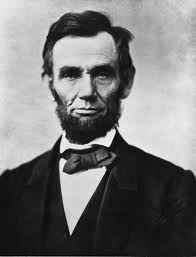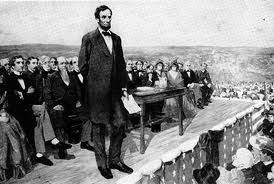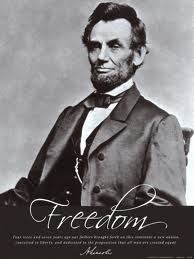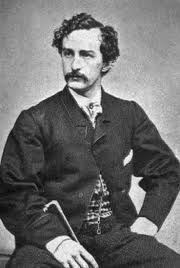 |
| Abraham Lincoln's inaugural photo (http://familypedia.wikia.com/wiki/Abraham_Lincoln_(1809-1865)/Biography) |
"Malice to none and charity for all" (Abraham Lincoln). Abraham Lincoln recited these words during his second Inauguration. He believed that even though the southern states did something wrongful, there was no reason to have hatred towards any fellow countrymen. The year was 1861, and a divided country was arguing about States' rights. Arguments became heated which caused the southern states to eventually succeed. A man named Abraham Lincoln was chosen as the new leader of the distressed nation. This man took on the task of restoring the country back to natural order. Lincoln conceived the Civil War by accomplishing some amazing feats. He brought a country back up from the rubble, enabled Emancipation, and fought through controversy of the war. In a time of need, Abraham Lincoln led a broken country back to reform, ended slavery once and for all, and despite the danger he faced he kept fighting for his country.
 |
| Abraham Lincoln giving a speech to his fellow cou (http://www.americanrhetoric.com/speeches/gettysburgaddress.htm) |
Abraham Lincoln showed many heroic qualities. One specific quality was how he singularly led a broken country through reform by ending slavery once and for all. Lincoln took office in 1860, at the beginning stages of the Civil War. Soon the southern states seceded from the northern states. Lincoln’s priority was leading this broken country back to unity. "When the southern states seceded, or separated from the union in early 1861, Lincoln focused his efforts on restoring the United States." (Emancipation Proclamation). Lincoln believed what the South did was illegal so throughout the Civil War he only focused on rebuilding the rogue nation. Lincoln also took pride in his country so when the South seceded he took it upon himself to fix the major problem. The South relied on slaves during the Civil War. Lincoln decided that emancipating the slaves through the Emancipation Proclamation would ensure the country would return to normal. "Lincoln would have supported slavery in whatever form necessary to maintain the Union.” (Emancipation Proclamation). Lincoln used slaves to try to keep what was left of the country balanced. Lincoln also was a man of honor because he put upon his shoulders to end slavery and bring the country back to the intent of the constitution.
 |
Abraham Lincoln showed many heroic traits but one went unnoticed. Despite the danger he faced every day, he kept fighting for his country. John Wilkes Booth was a well-known actor during the civil war who was a supporter of the confederates. He planned two attacks on President Lincoln, but he didn't succeed until after his second try. "By late 1864 booth hatched the risky plan to kidnap President Lincoln." (Swanson 95). Lincoln received many death threats from Confederate loyalists, despite the fear they instilled in him he pushed on. He also stayed strong for the people of the Union despite the fear of assassination. When Lincoln took office many Confederates planned to murder him. "In one notorious plot of 1861, local rebels scheduled to dispatch the president-elect when his railroad train passed through Baltimore on the way to Washington for his first inauguration." (Swanson 23). Many people in the South despised Lincoln for forcing the end of slavery. Surprisingly, Lincoln wasn't watched closely by body guards so death threats continuously showed up. Lincoln didn't back down from the gruesome fight between the split-nation, even though there were great consequences.
 |
In a time of dire consequences, Abraham Lincoln revived a suffering nation, emancipated slavery, and fought through dark times for the country he loved. Lincoln was a man of honor because of all the heroic deeds he did for his country. He carried the dying nation on his back. He also did the unthinkable; ended slavery. Finally he was the light at the end of the tunnel. Lincoln inspires me because he went from a young child living in poverty to a man saving his nation, even though as a child, everyone told him he couldn't do anything with his life. He had the qualities that every man would aspire to obtain; honorable, courageous, and caring. Lincoln once said himself, "Character is like a tree and reputation is like a shadow. The shadow is what we think of it; the tree is the real thing." (Abraham Lincoln Quotes).
Works Consulted
"Abraham Lincoln." Presidential Administration Profiles for Students. Ed. Kelle S. Sisung and Gerda-Ann Raffaelle. Detroit: Gale Group, 2003. Gale Student Resources In Context. Web. 6 May. 2011.
"Abraham Lincoln." The White House. Web. 03 May 2011.
"Abraham Lincoln Quotes - BrainyQuote." Famous Quotes at BrainyQuote. Web. 12 May 2011. "American Rhetoric: Abraham Lincoln - Gettysburg Address." American Rhetoric: The Power of Oratory in the United States. Web. 16 May 2011.
"Emancipation Proclamation." U*X*L Encyclopedia of U.S. History. Sonia Benson, Daniel E. Brannen, Jr., and Rebecca Valentine. Ed. Lawrence W. Baker and Sarah Hermsen. Vol. 3. Detroit: UXL, 2009. 496-499. Gale Student Resources In Context. Web. 6 May. 2011.
"Enid, Oklahoma - News, Events and Photos." Enid Buzz Enid, Oklahoma - OK. Web. 16 May 2011.
"“…Every Individual Is Naturally Entitled to Do as He Pleases with Himself and the Fruits of His Labor” Abraham Lincoln." ((( Www.IamTheTeaParty.net ))). Web. 16 May 2011.
"Gigaisland Entertainment Thursday (GET): The Life of Abraham Lincoln (eBook) - Gigaisland." Gigaisland - the Friendlier Side of Computer Services. Web. 16 May 2011.
Holzer, Harold. "Lincoln, Abraham." World Book Advanced. World Book, 2011. Web. 2 May 2011.
President, Killing The. "John Wilkes Booth, John Wilkes Booth Death, Abraham Lincoln." Civil War, American Civil War, Reconstruction. Web. 16 May 2011. Swanson, James L. Chasing Lincoln's Killer. New York: Scholastic, 2009. Print.
Page created on 5/19/2011 12:00:00 AM
Last edited 5/19/2011 12:00:00 AM
